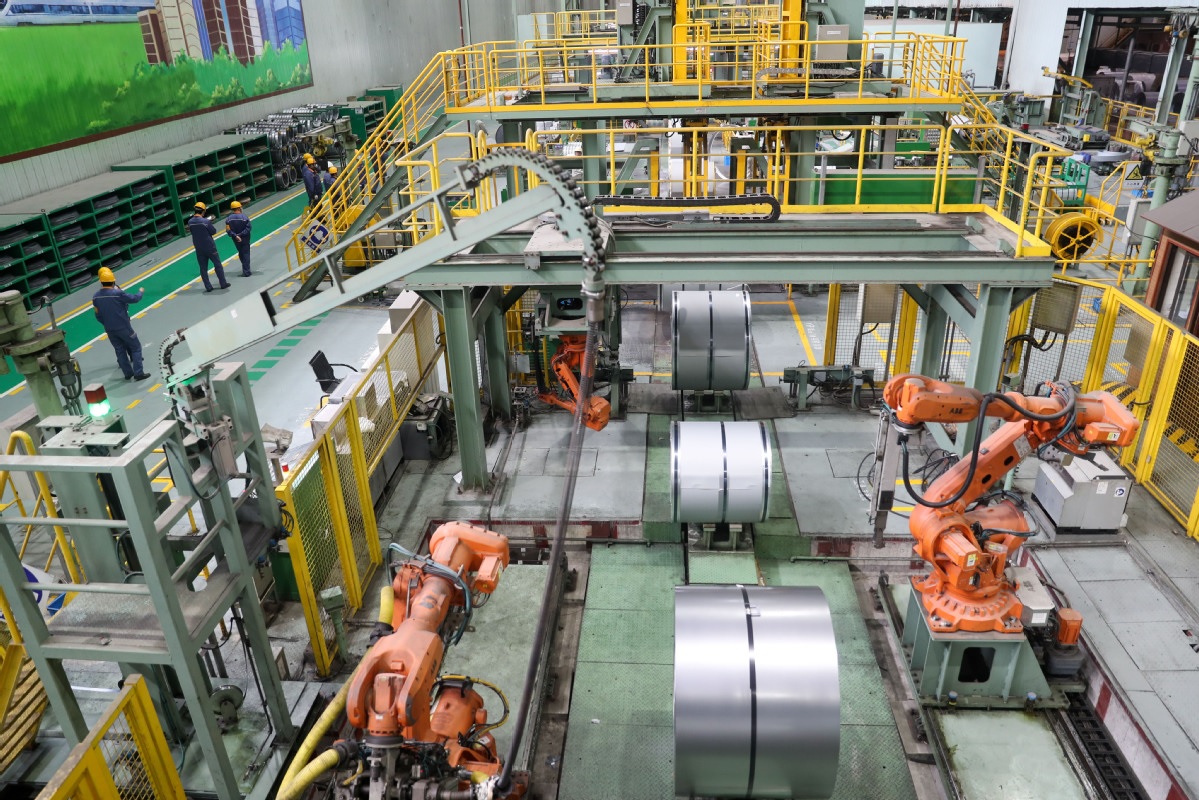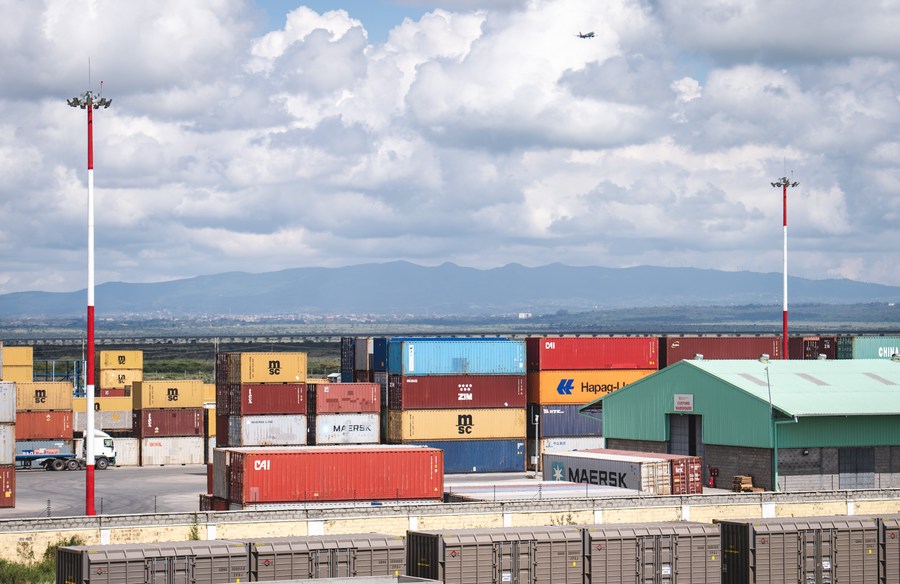China's economy harvests prosperity in golden autumn

This photo taken on Oct 15, 2023 shows a floral decoration at Xidan area in Beijing, capital of China. [Photo/Xinhua]
China's economy is enjoying a bountiful golden autumn in October with a stable positive trend boosting confidence across sectors, according to CCTV news on Sunday.
The economic progress extends to a wide variety of aspects, including the macro economy, small and medium-sized enterprises, the steel industry, the emerging cloud sector, the Belt and Road Initiative, trade exhibitions, technological advancements and others.
Strong growth momentum is evident in both domestic and international sectors, across traditional and emerging industries, reflecting China's resilient and consistent economic upturn.
China's economy continues to be on track toward a stable recovery, despite facing downward pressures, according to the National Bureau of Statistics on Wednesday.
The country's gross domestic product grew by 5.2 percent to 91.3 trillion yuan ($12.5 trillion) in the first three quarters, NBS data shows.
Its value-added industrial output - a gauge of activity in the manufacturing, mining and utilities sectors - grew by 4 percent in the first three quarters compared to the same period last year.
From January to September, retail sales grew by 6.8 percent year-on-year, while fixed-asset investment, including infrastructure, property, machinery and equipment, went up by 3.1 percent compared to the same period last year.
From January to August, China's SMEs have seen a sustained recovery in production and operations as reflected by electricity consumption, confidence index and operating margin.
The latest data shows that electricity consumption by micro and small enterprises increased by 2.4 percent year-on-year from January to August.
In August, SMEs achieved a 61.9 percent confidence index and a procurement index of 50.6 percent, up by 0.7 and 0.3 percentage points from July, respectively.
These enterprises continue to demonstrate strong innovative capabilities as data for the first eight months of this year shows that the value-added industrial output of SMEs increased by 3.6 percent year-on-year.
Among them, "little giants" - referring to SMEs that typically specialize in niche sectors - are commanding high market shares and boast a strong innovative capacity, achieving an operating margin of 10.3 percent.

A cold-rolled steel factory of Baosteel Co Ltd in Baoshan district, Shanghai. [Photo/Xinhua]
China's steel production has steadily increased in 2023, with its proportion of global output growing, according to the 12th China International Steel Congress and the Global Low-Carbon Metallurgy Innovation Forum 2023 held in Shanghai.
Data shows that China's steel production accounted for 53.9 percent of the global total in 2022 and the industry focuses on low carbon emissions and optimal energy efficiency.
In the first eight months of this year, companies improved their steel production efficiency with a 0.1 percent reduction in energy use, 0.36 percent less electricity consumption and a 3.4 percent decrease in freshwater consumption per ton of steel.
Major steel enterprises have achieved world-leading levels of air pollutant emission intensity, with over 500 million tons of production capacity having completed or undergoing ultra-low emission upgrades.
Telecommunication and technology firms are boosting investments in the cloud industry. The rapid development of next-generation information technologies, led by cloud computing, has fostered new industries and revitalized traditional ones.
Data from the Ministry of Industry and Information Technology shows that, in the first half of this year, the cloud computing market exceeded 260 billion yuan ($35.55 billion), a year-on-year growth of over 40 percent.
The surge has prompted major telecom companies and internet giants to put more investments in the cloud industry.
China's cloud market is expected to remain in a high-growth phase and the overall market size is projected to surpass a trillion yuan by 2025, according to the China Academy of Information and Communications Technology, or CAICT, a Beijing-based think tank.

This photo taken on May 23, 2023 shows containers to be transported near the Nairobi Station of the Mombasa-Nairobi Railway in Nairobi, Kenya. [Photo/Xinhua]
Since the Belt and Road Initiative was proposed in 2013, economic cooperation between China and participating countries has borne fruit.
From 2013 to 2022, the cumulative value of imports and exports between China and BRI partner countries reached $19.1 trillion, with an average annual growth rate of 6.4 percent.
In 2022, the value of imports and exports between China and partner countries reached nearly $2.9 trillion, accounting for 45.4 percent of China's total foreign trade over the same period, representing an increase of 6.2 percentage points compared with 2013.
The cumulative two-way investment between China and partner countries reached $380 billion, including $240 billion from China, which has injected imputes into the global trade and investment.
The 134th session of the China Import and Export Fair, also known as the Canton Fair, opened with a record exhibition area on Sunday in Guangzhou, South China's Guangdong province.
The fair covers a total exhibition area of 1.55 million square meters, featuring over 28,000 participating companies, both of which mark record highs.
According to data, over 50,000 overseas buyers attended the fair on opening day.
The fair's import section has further expanded, hosting 650 companies from 43 countries and regions. Among them, 60 percent of these exhibitors are from countries participating in the Belt and Road Initiative.
The World Marine Equipment Expo 2023 closed on Sunday in Fuzhou, Fujian province, with business deals worth over 60 billion yuan sealed.
The event, covering an exhibiting area of nearly 100,000 square meters, focused on the cutting-edge technologies and achievements in the maritime equipment sector.
In recent years, China has made remarkable advancements in high-tech research and development and the construction of maritime equipment.
Highlights include the operation of the Bacalhau, the world's first M350 floating, production, storage and offloading vessel, and the maiden voyage of China's first domestically built large cruise ship, Adora Magic City.
The share of advanced ship types produced in China keeps increasing, injecting fresh energy to the global maritime equipment industry with Chinese innovation.
The 13th China International Patent Fair, held in Dalian, Liaoning province from Oct 14 to 16, featured the participation of over 2,400 patent projects.
The event focused on the intellectual property achievements guiding industry digital transformation and valuable patent technologies and products in related fields.
From 2016 to 2022, China's core industries in the digital economy saw an average annual growth rate of 18 percent in granted invention patents.
By the end of 2022, the total number of granted invention patents in China's core digital economy industries had reached 1.6 million, accounting for 38 percent of the total granted invention patents.
These patents have played a vital role in the progress of digital transformation within the industry.
Photos
Related Stories
- Policy-led growth seen helping meet GDP target
- GT Voice: Stronger-than-expected growth testifies to China’s resilience
- China's property investment keeps cooling in first three quarters
- China's resident nominal disposable income up 6.3 pct in first three quarters
- China’s GDP expands 4.9% in Q3 as economic recovery momentum strengthens
Copyright © 2023 People's Daily Online. All Rights Reserved.









